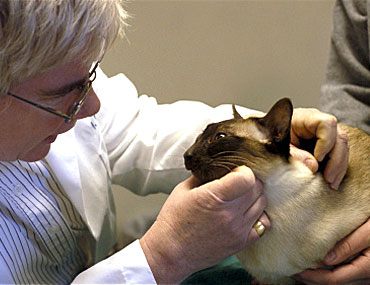
When a patient presents with anemia a stepwise approach should be followed. Autoimmune Hemolytic Anemia AIHA Autoimmune hemolytic anemia AIHA is typically a regenerative form of anemia in cats.

Consequent complement activation can impact the clinical picture and is an emerging target for therapeutic approaches.
What causes autoimmune hemolytic anemia in cats. Immune-mediated hemolytic anemia IMHA occurs less frequently in cats than in dogs. The value of the Coombs test CT has been questioned but detailed surveys of its use are lacking. The objective of this study was to describe 19 cats with primary IMHA pIMHA and to examine the diagnostic value of the direct CT.
The CT was performed in 92 cats. It was negative in 5 healthy in 9 sick nonanemic and in 55 cats with different types of anemia. The CT was positive in 18 anemic cats.
Autoimmune hemolytic anemia in dogs and cats. Switzer JW Jain NC. As improved diagnostic reagents become available greater diagnostic accuracy can be expected.
After a thorough clinical and laboratory examination intensive therapy must be started immediately and maintained until clinical remission is achieved. An effort must be made to determine the existence of associated disease. Autoimmune hemolytic anemia in sibling cats.
6906081 PubMed - indexed for MEDLINE Publication Types. Anemia Hemolytic Autoimmuneveterinary Animals. The most common underlying cause of anemia is chronic disease as anemia is a typical side effect of age-related health conditions Dr.
The system gets turned off. With kidney disease for example you are losing blood but you cant make more What Are. Immune-mediated hemolytic anemia IMHA is an important cause of morbidity and mortality in dogs.
IMHA also occurs in cats although less commonly. IMHA is considered secondary when it can be attributed to an underlying disease and as primary idiopathic if no cause is found. Eliminating diseases that cause IMHA may attenuate or stop immune-mediated erythrocyte destruction and adverse.
The cause or causes of autoimmune disease are not understood although some theorize that genetics andor environmental pollutants play a role. Certain drugs have also been reported as potential triggers for pemphigus foliaceus a common form of autoimmune skin disease in cats. Early recognition is extremely important.
It is still unclear what the exact cause of any autoimmune disease is but some of the possible culprits range from stress to certain drugs or environmental pollutants. One of the most dangerous types of autoimmune diseases in cats is Systemic Lupus Erythematosus. Generally associated with subclinical disease in cats hemolytic anemia is a consequence of several human Bartonella spp.
Infections including a case of human hemolytic anemia caused by Bartonella henselae. Studies have also demonstrated the intraerythrocytic location of B. Henselae in naturally-infected cats.
However an epidemiologic study attempting to correlate various organisms. Inherited red blood cell disorders can also cause anemia in cats. Deficiencies of an enzyme called pyruvate kinase are seen in Abyssinian and Somali cats.
Affected cats have hemolytic anemia that waxes and wanes over a long time. Signs may improve if the spleen is removed or if corticosteroids are given. A hereditary blood disorder.
Moderate to severe hypophosphatemia can also cause hemolytic anemia especially in cats. Autoimmune Hemolytic Anemia AIHA Autoimmune hemolytic anemia AIHA is typically a regenerative form of anemia in cats. If your cat is diagnosed with AIHA their body is likely producing red blood cells as it should however the cells are being destroyed by the body.
This can be due to a number of reasons including immune system dysfunction small blood vessels disease metabolic disorders. There are many diseases and conditions that can cause anemia in cats. A low red blood cell count can be the result of blood loss the destruction of the red blood cells or an inadequate production of new red blood cells.
When your cat has IMHA it means her immune system destroys its own red blood cells. Your cats body still produces red blood cells in the bone marrow to replace the destroyed cells but once. Other causes of hemolytic anemia include hypophosphatemia drugs and toxins.
For More Information Also see Pet Health content regarding hemolytic anemia in dogs hemolytic anemia in cats and hemolytic anemia in horses. Occasionally a cats body tags its own red blood cells as foreign causing them to be destroyed by the cats own immune system. This is called Immune-mediated hemolytic anemia often abbreviated to IMHA.
In some cases there is a trigger causing the immune system to incorrectly destroy too many red blood cells. This trigger can include a reaction to a drug cancer or infectious diseases. Autoimmune hemolytic anemia AIHA is a decompensated acquired hemolysis caused by the hosts immune system acting against its own red cell antigens.
Consequent complement activation can impact the clinical picture and is an emerging target for therapeutic approaches. When a patient presents with anemia a stepwise approach should be followed. What causes anemia in cats.
The most common causes for anemia in cats include. Parasitic infection such as gastrointestinal parasites fleas and ticks etc Kidney failure and the lack of the kidneys producing the hormone erythropoietin which.